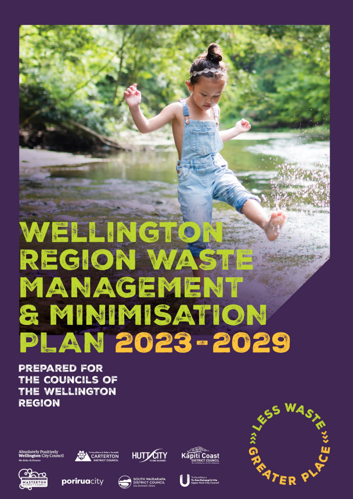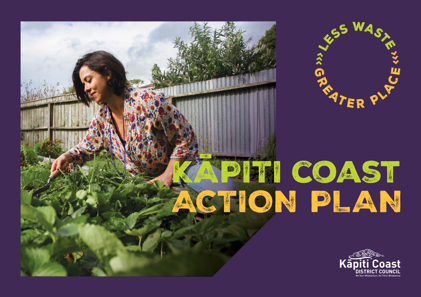- About Council
- Have your say
- News and information
- Meetings
- Projects
- Job vacancies
-
Plans and reports
- Annual and Long-term Plans
- District Plan
- Council strategies and plans
- Council policies
- Bylaws
-
Reports
- Annual alcohol licensing reports
- Annual dog control reports
- Annual reports
- Annual wastewater reports
- Annual water reports
- Council performance reports
- Economic development reports
- GHG emissions reports
- Independent organisational review 2019
- Local outcome reports
- Other reports
- Pre-election reports
- Urban development capacity reporting
- Wellington region reports
- Resources and reference materials
- Partners and advisory groups
- Contact us
Wellington region Waste Management and Minimisation Plan
The Wellington region's Waste Management and Minimisation Plan (WMMP) helps us promote effective and efficient ways to manage and minimise waste, and agree objectives and policies for effective and efficient forms of minimising waste, and promote these.
Waste Management and Minimisation Plan 2023–29
We worked with the other seven councils across our region (Carterton, Hutt, Masterton, Porirua, South Wairarapa, Upper Hutt, and Wellington) to develop a new Wellington Region Waste Management and Minimisation Plan 2023–29 [PDF 1.83 MB] (WRWMMP).
This plan outlines how the eight councils, mana whenua, businesses, industry and our communities can work together to change how we create, manage, and minimise waste in the Wellington region. The plan's required under the Waste Management Act 2008 and covers 2023–29 and beyond.
The way we consume products creates large quantities of waste, and there's a lot of waste going into our landfills that could be diverted. Our current system of taking materials from the Earth, making products from them, and eventually throwing them away as waste is recognised more and more as a major contributor to climate change, biodiversity loss and pollution.
We talked with industry, non-government organisations (NGOs) and other stakeholders to understand the challenges and opportunities for waste minimisation in our region, as well as how we can work together to support initiatives to reuse, recycle, repurpose and repair goods and materials instead of sending them to landfill.
The WMMP sets out key principles to help us reduce waste as a region. These set how we’ll work together to minimise waste – for our people, environment, and economy.
The guiding principles are:
- Waste reduction – we’ll lead the reduction of waste in line with te pūnaha whakarōpū para (the waste hierarchy), and support those already engaged in reducing waste. We’ll also work to increase material and product circularity.
- Circular economy – we’ll promote a circular economy and help reduce the environmental impacts of waste across the Wellington region by keeping materials at their highest value for as long as possible and increasing the reuse and recovery of resources.
- Environmental guardianship – the natural environment is interconnected with people. We recognise the need to protect, enhance, and restore ecosystems by valuing natural resources and making the best use of them for current and future generations.
- Challenging mindsets – resources are finite, and we need to change our habits and behaviours to focus on the circularity of materials, ensuring sustainable and responsible consumption, and reuse and recovery of products and materials. We’ll work to change people’s perspectives across the Wellington region.
- Collaboration and participation – we’ll look for opportunities to collaborate with other councils across the region, as well as with mana whenua, businesses, industry, and communities. We’ll support and build mana whenua and community capacity and capability to deliver wider economic, social, cultural, and environmental benefits to our communities.
- Resilient waste and resource recovery systems – we’ll continue to invest in the Wellington region waste and resource recovery system and our data management systems in line with te rautaki para (the waste strategy and action and investment plan) to make sure they’re fit for purpose. We’ll follow best practice to manage residual waste.
The WMMP includes nine objectives to help us achieve the guiding principles. These signal a shift in how we think about waste.
Targets
To measure progress against each of the nine objectives, the WMMP also includes targets to help embed the changes for the Wellington region.
Our targets are to:
- Reduce the total amount of material that needs final disposal to landfill by 10 percent by 2027, and 30 percent by 2030.
We'll work towards this by achieving the following sub-targets:
a. Ensuring construction and demolition waste processing and recovery is available in the Wellington region by 2026.
b. Ensuring organic processing systems are available to the Wellington region by 2029.
c. Ensuring five new resource recovery locations are added to the existing network within the Wellington region by 2030. - Reduce emissions from biogenic methane by reducing the total amount of organic waste disposed to landfill by 50 percent by 2030.
- Reduce emissions from the collection and transport of kerbside waste by 30 percent by 2030.
- Ensure all urban households have access to kerbside recycling collections by 2027.
- Ensure food scraps collection services are available to urban households by 2030.
- For each council to engage with and support 30 percent of the business community to minimise waste and implement waste minimisation activities by 2029
What the WMMP means for you
We all play a role in the waste management and minimisation, as a producer, consumer, or processor of waste.
The WMMP includes local action plans for each council, outlining what we’re doing for you and your community, to help reduce waste.
This is our plan to reduce and manage waste, and reading it will help you understand how we’ll manage and minimise waste in our area.
Everyone can help minimise waste, by buying less, producing less, reducing food waste, reusing items, and recycling correctly.
Our local action plan
Our local action plan [PDF 1.51 MB] was specifically written by Council, and feeds into the wider vision for our region.
Our plan outlines the 17 actions for how we plan manage and reduce waste over the next few years.

